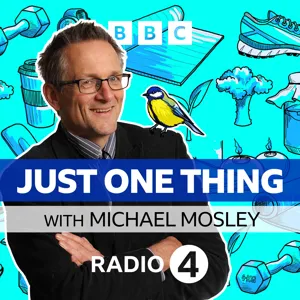Podcast Summary
Exploring methods for inner peace and relaxation: Find joy in relaxation through music, podcasts, meal delivery services, and special offers to prioritize mental and emotional well-being
We can find inner peace and relaxation through various methods, including listening to calming music and practicing relaxation techniques. Advertisements and daily routines can sometimes feel monotonous and uninspiring, but there are ways to add excitement and value to our lives. For instance, trying new meal delivery services like HelloFresh can make dinner time more enjoyable, and taking advantage of special offers, like Mint Mobile's deal for Paramount Plus, can provide entertainment and savings. Amidst the fast-paced world we live in, it's essential to prioritize our mental and emotional well-being. The Deep Calm podcast, with its scientifically proven relaxation techniques, offers a sanctuary of calm and stillness, allowing us to tap into our inner peace and restore our energy. So, whether it's through music, podcasts, or simple pleasures, let's make an effort to prioritize our relaxation response and find joy in the everyday.
Relax with Music: Stimulate Your Parasympathetic Nervous System: Listening to relaxing music can lower heart and breathing rates, reduce stress hormones, and evoke positive feelings, making it a powerful tool for relaxation and stress reduction.
Music has the power to stimulate our parasympathetic nervous system, which helps us relax, reduce stress, and improve both mental and physical well-being. Studies have shown that listening to relaxing music can lead to lower heart and breathing rates, reduced stress hormones, and increased positive feelings. Even premature babies in intensive care units have benefited from this musical intervention. Music's ability to evoke relaxation is a universal response, as seen in the similarities of lullabies across cultures. So, next time you need a break, take a moment to listen to your favorite relaxing music and let it work its magic.
Relaxing sounds activate the parasympathetic nervous system for calming responses: Listening to calming music can decrease heart rate, blood pressure, and breathing rate, reduce pain, and interrupt negative thought loops
Our brains are naturally wired to respond calmingly to soothing sounds, whether they're found in lullabies or relaxing music. This response is biologically ingrained and doesn't require learning. The calming properties of these sounds are due to their slower pace, fewer high frequency components, and less pitch variation. When we listen to relaxing music, the sound waves are converted into brain signals that activate the parasympathetic nervous system, leading to relaxation responses such as slowed heart rate, breathing, and digestion. Studies have shown that listening to calming music can decrease heart rate, blood pressure, and breathing rate, as well as reduce pain and interrupt negative thought loops. A recent discovery even suggests that tapping along to music can amplify these analgesic effects. Try putting on positive, calming music, taking deep breaths, and counting beats to help break negative thought patterns.
Relax with music: Switch off negative thoughts: Listening to relaxing music can help direct your mind away from negative thought loops, activate the parasympathetic nervous system, and increase calming neurotransmitters, leading to relaxation and stress reduction.
Music can be a powerful tool for helping us switch off negative thought loops and relax. Slower, repetitive melodies with a soft beat can be particularly effective, as they allow our brains to focus on the music and use up mental resources, leaving fewer for negative thoughts. To get the most benefit, try listening comfortably, focusing your attention on the music, and participating by tapping along or breathing in time with the beats. This can help direct your mind away from negative thought loops and towards a state of relaxation. As the music travels through the ear to the brain stem, it activates the parasympathetic nervous system, leading to a decrease in heart rate, blood pressure, and stress hormones, and an increase in the calming neurotransmitter GABA. Overall, just a few minutes of focused listening to relaxing music can be a regenerative and peaceful experience.
Explore calming resources like podcasts and meal delivery services: Podcasts like 'Deep Calm' offer guided meditations and inspirational guests, while HelloFresh delivers delicious meal options to bring new flavors into your home.
There are numerous calming resources available for listeners, such as the BBC Radio 4 podcast "Deep Calm," which can be accessed on BBC Sounds. This podcast, presented by Michael Moseley, offers guided meditations, inspirational guests, and beautiful music to help listeners take a break from their busy lives. Additionally, for those feeling stuck in a culinary rut, HelloFresh provides an exciting solution. Announced by KiKi Palmer, this service offers delicious meal options that can be easily ordered and delivered, bringing new and flavorful dishes into the home. Whether it's through meditation or meal delivery, there are various ways to introduce variety and relaxation into daily life.

